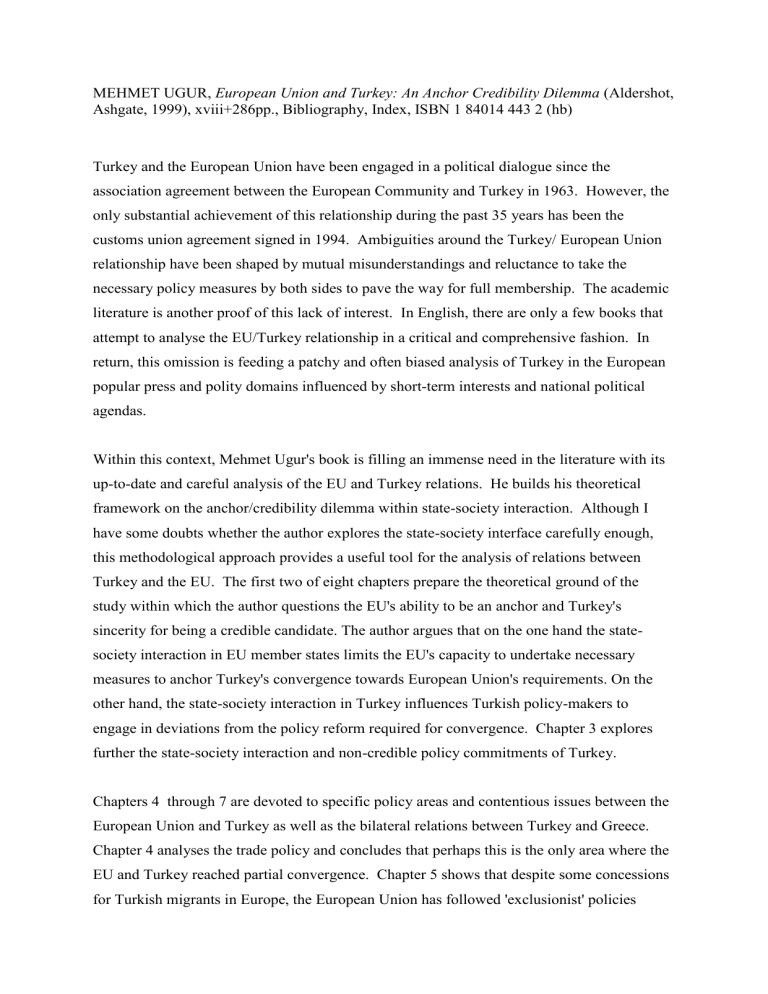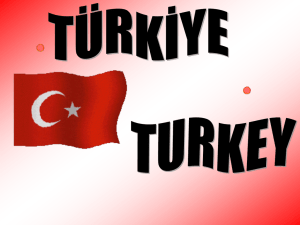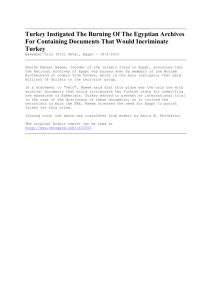Book review Ugur 1

MEHMET UGUR, European Union and Turkey: An Anchor Credibility Dilemma (Aldershot,
Ashgate, 1999), xviii+286pp., Bibliography, Index, ISBN 1 84014 443 2 (hb)
Turkey and the European Union have been engaged in a political dialogue since the association agreement between the European Community and Turkey in 1963. However, the only substantial achievement of this relationship during the past 35 years has been the customs union agreement signed in 1994. Ambiguities around the Turkey/ European Union relationship have been shaped by mutual misunderstandings and reluctance to take the necessary policy measures by both sides to pave the way for full membership. The academic literature is another proof of this lack of interest. In English, there are only a few books that attempt to analyse the EU/Turkey relationship in a critical and comprehensive fashion. In return, this omission is feeding a patchy and often biased analysis of Turkey in the European popular press and polity domains influenced by short-term interests and national political agendas.
Within this context, Mehmet Ugur's book is filling an immense need in the literature with its up-to-date and careful analysis of the EU and Turkey relations. He builds his theoretical framework on the anchor/credibility dilemma within state-society interaction. Although I have some doubts whether the author explores the state-society interface carefully enough, this methodological approach provides a useful tool for the analysis of relations between
Turkey and the EU. The first two of eight chapters prepare the theoretical ground of the study within which the author questions the EU's ability to be an anchor and Turkey's sincerity for being a credible candidate. The author argues that on the one hand the statesociety interaction in EU member states limits the EU's capacity to undertake necessary measures to anchor Turkey's convergence towards European Union's requirements. On the other hand, the state-society interaction in Turkey influences Turkish policy-makers to engage in deviations from the policy reform required for convergence. Chapter 3 explores further the state-society interaction and non-credible policy commitments of Turkey.
Chapters 4 through 7 are devoted to specific policy areas and contentious issues between the
European Union and Turkey as well as the bilateral relations between Turkey and Greece.
Chapter 4 analyses the trade policy and concludes that perhaps this is the only area where the
EU and Turkey reached partial convergence. Chapter 5 shows that despite some concessions for Turkish migrants in Europe, the European Union has followed 'exclusionist' policies
toward the free movement of labour. Another anchor/credibility dilemma appears in the
Cyprus problem (Chapter 6). The author points out that Greece has used all opportunities to raise obstacles to the normalisation of the EU/Turkey relations. But he also stresses that both
Turkey and the EU used Greek objections to distract attention away from their failures to meet their obligations. Chapter 7 demonstrates that while Turkey has made limited progress in improving its human rights, the EU has used the issue as a membership deterrent rather than an effective policy instrument with sanctions and incentives.
The book would have been stronger had the author considered the increasing diversity and heterogeneity in Turkish society and economy. Turkey’s state-society interaction is no longer based on a strong presence of the state within the economy as both an entrepreneur and regulator. Industrialisation in the small and medium-sized towns of Anatolia came through indigenous private capital and not only changed the economic geography of the country but also affected Turkish policy. This transformation, coupled with the active support provided to the PKK (the Kurdistan Worker's Party) by some EU members and the
EU's ineptness in preventing autocracies committed against Muslims in Bosnia and Kosovo, will make it hard to justify the economic pressures and sacrifice needed for the convergence measures. On the European Union's side the de facto emergence of a multi-tier Europe with the EMU and eastern enlargement will put extra pressures on EU policy making bodies and further exacerbate the anchor/credibility dilemma.
GÜL BERNA ÖZCAN
The School of Management, Royal Holloway College, University of London,
Egham Surrey, TW20 0EX






